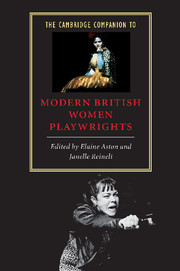Book contents
- Frontmatter
- 1 A century in view: from suffrage to the 1990s
- Part I Retrospectives
- Part II National tensions and intersections
- Part III The question of the canon
- Editors’ note
- 10 Pam Gems: body politics and biography
- 11 Caryl Churchill and the politics of style
- 12 Violence, abuse and gender relations in the plays of Sarah Daniels
- Part IV The subject of identity
- Index
12 - Violence, abuse and gender relations in the plays of Sarah Daniels
from Part III - The question of the canon
Published online by Cambridge University Press: 28 May 2006
- Frontmatter
- 1 A century in view: from suffrage to the 1990s
- Part I Retrospectives
- Part II National tensions and intersections
- Part III The question of the canon
- Editors’ note
- 10 Pam Gems: body politics and biography
- 11 Caryl Churchill and the politics of style
- 12 Violence, abuse and gender relations in the plays of Sarah Daniels
- Part IV The subject of identity
- Index
Summary
Introduction
Representations of the abuse of and violence against women are central to the plays of Sarah Daniels. This she shares with Andrea Dworkin, American radical feminist activist and campaigner against violence against women, whose work has informed Daniels’s writings. In her introduction to Plays 1 Daniels states that she wrote her perhaps best-known play, Masterpieces, in part as a consequence of having read Dworkin’s Pornography: Men Possessing Women, and she also mentions Dworkin’s Letters from a War Zone. Both women have been attacked for their work which has been regarded as man-hating. Significantly, talking of her first play, Ripen Our Darkness (1981), Daniels wrote that 'nobody, except women, thought the men were drawn with any accuracy' (Introduction, Plays 1, p. x).
The notion of any form of 'extremism' on the part of women, 'extremism' here meaning simply a critique of women’s domination by men, has always been a source of recrimination against women. This is demonstrated in Daniels’s Byrthrite (1986), for example, which centres on women’s persecution in the seventeenth century. Daniels herself has not escaped this fate. It is to her credit that this has not deterred her from addressing what remain abidingly serious issues: the oppression of women and their exploitation by men. Her most recent play, Blow Your House Down (1995), for instance, deals with the case of the Yorkshire Ripper, a figure of great terror for women in Northern England during the second half of the 1970s when he murdered and mutilated many women in a gruesome manner.
- Type
- Chapter
- Information
- The Cambridge Companion to Modern British Women Playwrights , pp. 194 - 212Publisher: Cambridge University PressPrint publication year: 2000
- 3
- Cited by



